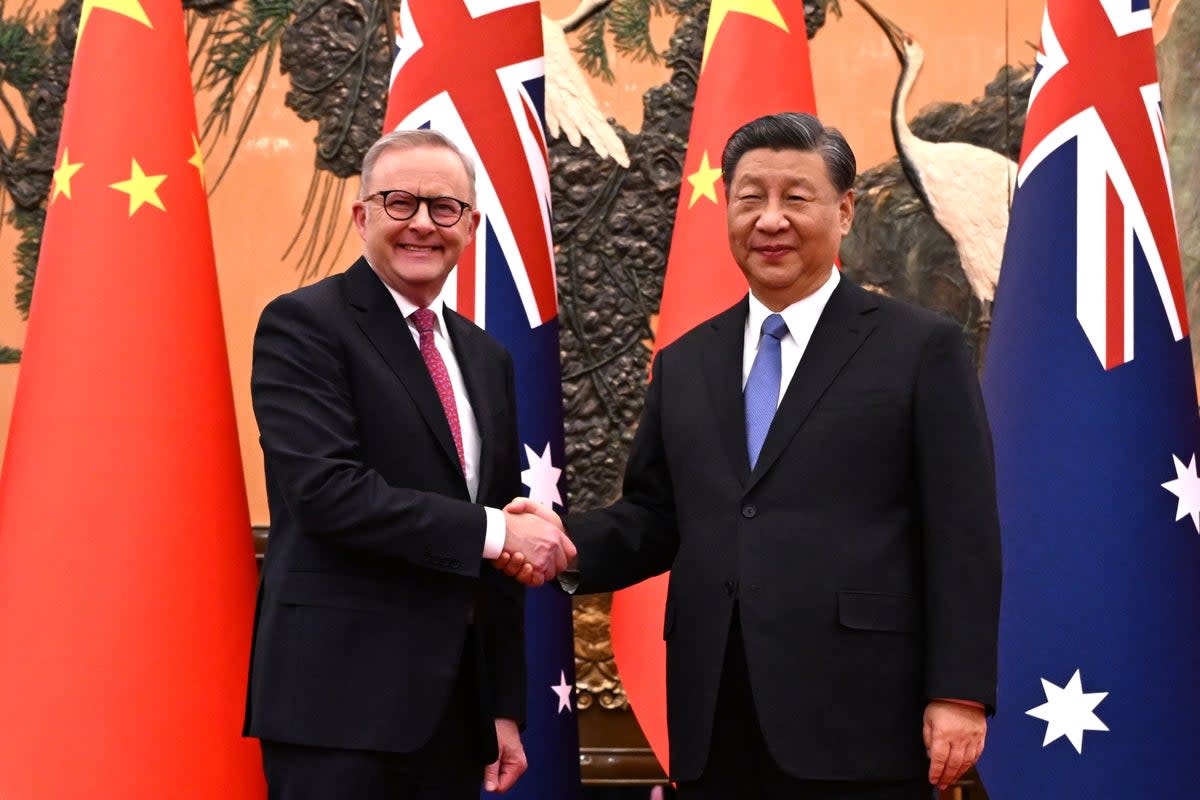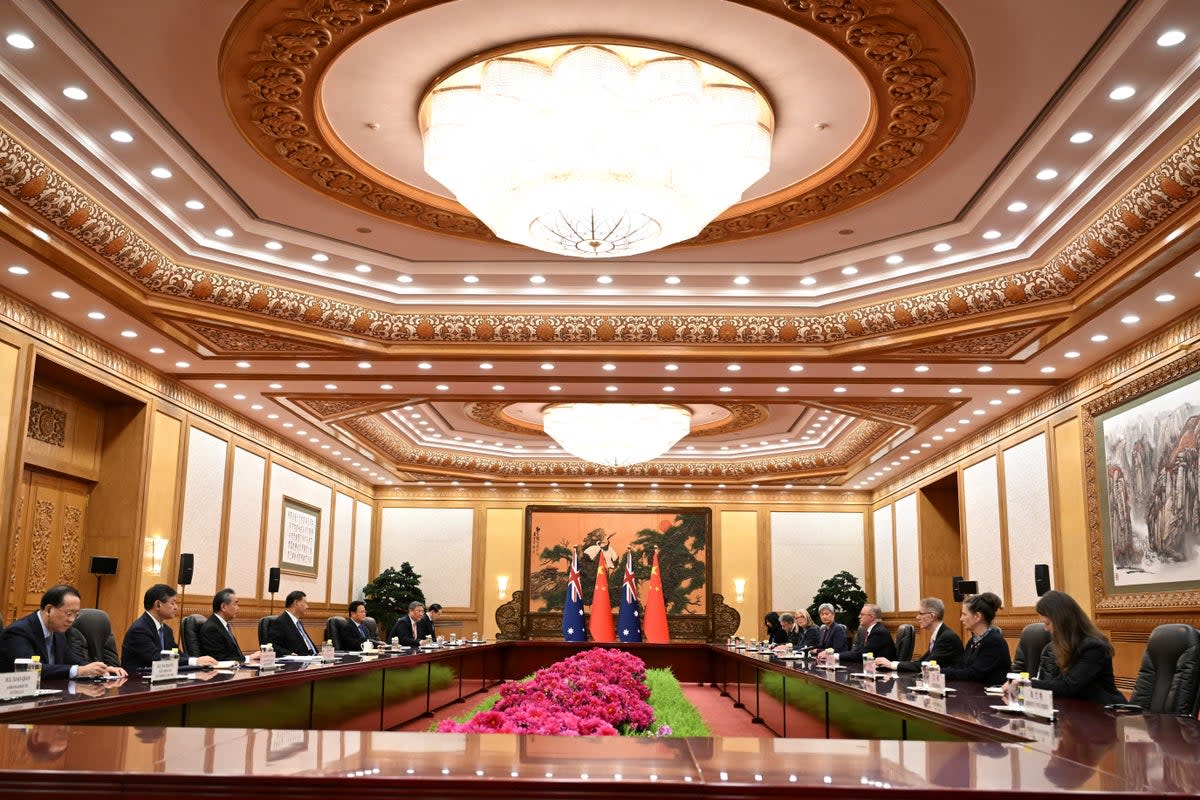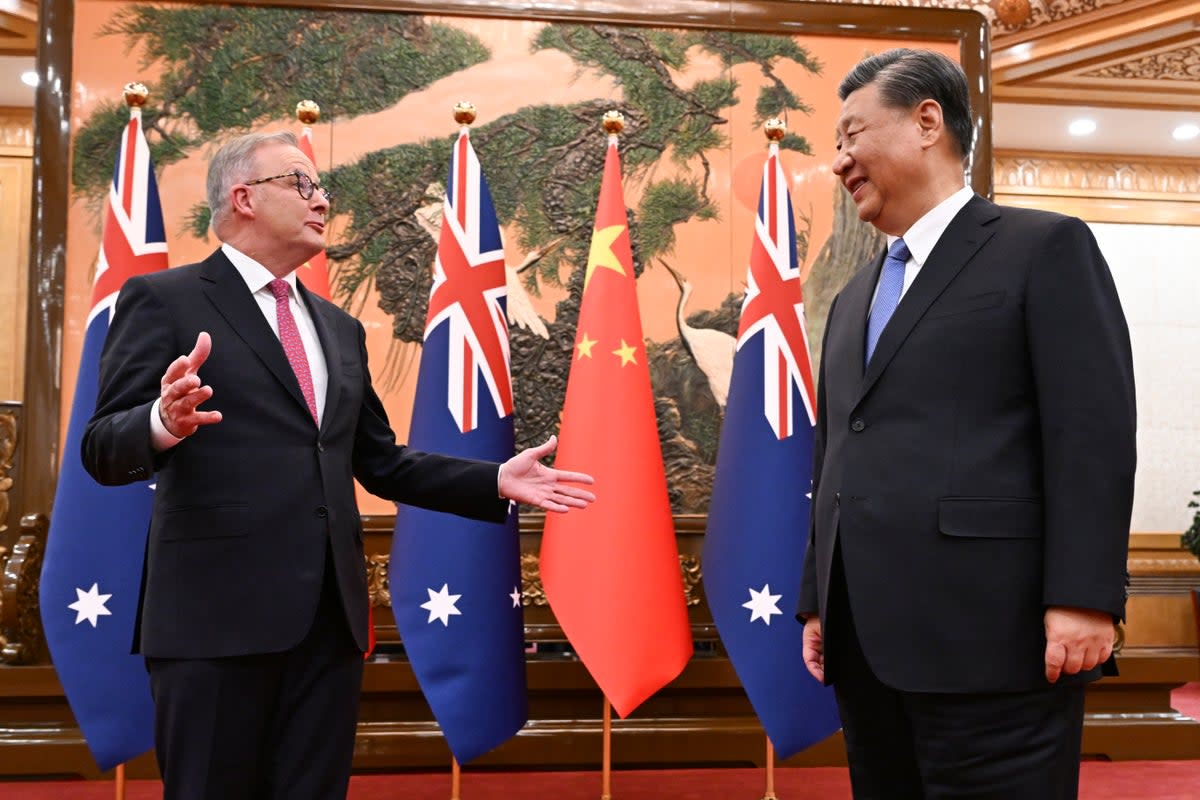Australian PM meets Xi Jinping during historic China trip signalling thaw in frosty diplomatic ties

Chinese president Xi Jinping met Australian prime minister Anthony Albanese in Beijing during what is being seen as a historic moment marking the thaw in frosty ties between the two countries.
Mr Albanese has become the first Australian leader to visit mainland China in seven years as diplomatic tensions overshadowed the trade and security relations with Beijing imposing bans and tariffs on a range of Australian imports.
The two leaders greeted each other with a smile and shook hands at the start of their bilateral talks at the Great Hall of the People.
Mr Xi praised the Australian leader for working to stabilise ties with China since being elected and said Beijing seeks to advance "harmonious" cooperation to achieve mutual benefit.
"With joint efforts of both sides we’ve been resuming our exchanges in various views and worked out some problems," Mr Xi said.
"Now the China-Australia relationship has embarked on the right path of improvement and development."
Mr Albanese responded, saying the moment was “indeed a historic time" and their progress in advancing the relations have been “unquestionably very positive”.
He said Australia has an interest in the continued stable growth of China’s economy and its ongoing engagement with the world
"I believe that we can all benefit from the greater understanding that comes from high level dialogue and people to people links and that a strong relationship between our two countries will be beneficial into the future.
"Where differences arise, it’s important that we have communication."
Following their meeting, Mr Albanese said he invited the Chinese leader to visit Australia and that he walked “satisfied” with the positive engagement.

His landmark visit coincides with the 50th anniversary of the first trip by an Australian prime minister to the People’s Republic of China. The trip is seen largely symbolic as Gough Whitlam visited China to meet Mao Zedong in 1973 in what was the first state visit by an Australian leader to Beijing after the establishment of diplomatic ties.
The relations between the two strong trade partners deteriorated over the recent years as Canberra grew suspicious over Chinese interference in Australian politics and later China criticised Australia for its call for an inquiry into the origins of the Covid-19 virus.
China responded by enacting tariffs on Australian exports such as beef, wine and barley that cost Australian exporters up to AU$20bn ($13bn) a year.
The Australian prime minister struck an optimistic tone and hailed his China visit for “promising signs” of engagement between the two countries on Monday ahead of his meeting with Mr Xi.
Mr Albanese is meeting Mr Xi for the second time since elected after holding a meeting on the sidelines of Bali G20 summit in 2022.
The visit is being closely watched by US observers as Canberra strives to maintain a diplomatic balance between its economic ties with China and its seven-decade security alliance with Washington.

Mr Albanese arrived on Saturday in Shanghai and met with the Chairman of the Standing Committee of the National People’s Congress Zhao Leji who said Beijing and Canberra are "at a new starting point".
"China is ready to work with Australia to improve, maintain and develop our relations, to enhance mutual trust, strengthen exchanges, expand cooperation, consolidate the friendship," he said.
"So as to deliver greater benefits to our two countries and peoples."
The prime minister is joined by foreign minister Penny Wong and Australia’s Ambassador to China, Graham Fletcher.
In the morning, before his meeting with Mr Xi, Mr Albanese and Ms Wong toured Beijing’s Temple of Heaven and the Australian leader remembered former prime minister.
But said “much has changed” since his visit.
Mr Xi also paid tribute to Australian leader Whitlam and remembered his role in establishing diplomatic ties 50 years ago with an idiom.
"In China we often say when drinking water we should not forget those who dug the well," President Xi said.
"The Chinese people will not forget prime minister Whitlam for digging the well for us."
Attending the China International Import Expo in Shanghai on Sunday to promote Australian produce and businesses, he called for “constructive economic engagement”.
But he stopped short of saying he trusted China when he was asked by a reporter if he can “trust” Beijing.
"We have different political systems, but the engagement that I’ve had with China or with President Xi had been positive, they have been constructive," Mr Albanese said.
"[President Xi] has never said anything to me that has not been done.
It is 50 years since Gough Whitlam became the first Australian Prime Minister to visit China.
Since he visited the Temple of Heaven in Beijing much has changed.
But what is constant is that engagement between our two countries remains important. pic.twitter.com/NInb093o3J— Anthony Albanese (@AlboMP) November 6, 2023
"We deal with each other at face value, and we deal with each other representing — my job is to represent Australia’s national interests, he is the leader of a different nation with different interests”.
With trade dominating the talks, discussions are expected to be overshadowed by other unresolved issues and security apprehensions.
Australian author Yang Hengjun, whose health is reportedly declining rapidly, has been detained in China on espionage allegations since 2019. Mr Albanese is under domestic pressure to secure his release.
Canberra is also seeking to mend ties amid its defence partnership with the US and the UK. Under the Aukus pact, widely seen as aimed at countering China in the Indo-Pacific, Australia would get at least three nuclear-powered submarines.
Ms Wong met his Chinese counterpart earlier on Monday.
"The history of [former] prime minister Whitlam being here reminds us that whoever is in these jobs, it’s incumbent upon us to seek to navigate this relationship wisely," Ms Wong said before she met with the Minister of Commerce, Wang Wentao.
"That’s what we’re here to do."
